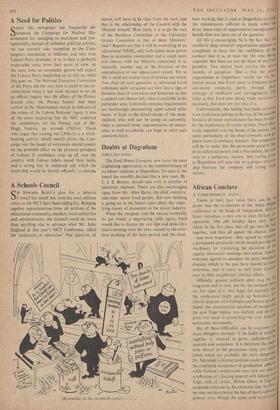African Conclave
A CORRESPONDENT writes : Taken at their face value there can be no doubt that the resolutions of the Addis Ababa conference of the heads of independent African States introduce anew era in inter-African co- operation. The old hurdles have now been, taken, the first place they all got into the 1131' together, and they all signed the charter. I [le,,it —and most important—they agreed to establish a permanent secretariat which should provide the machinery for translating the decisions of the regular ministerial meetings into action. Finally' everyone agreed to abandon the petty boundary disputes which in the past have caused so much bitterness, and to cease as well from interfer' ence in their neighbours' internal affairs. Officially, greater political unity may be the long-term end in view, but for the moment there
.
are few signs of it. Any hope. for example, th31 the conference might patch up Somalia's tel.,: ritorial disputes with Ethiopia and Kenya quick° faded, the controversial question of recognisil* the new Togo regime was shelved, and no pro' gress was made in reconciling the rival AnViari nationalist movements. But all these difficulties can be overcome-14s many delegates stressed--if the habit of wor1;14 together is allowed to grow, unhindered by quarrels and suspicions. It is therefore the sh°rt, term threats to the precarious unity just estP lished which are probably the most dangerous'e Dr. Nkrumah's internal position'could well rilakit his continued acceptance of gradualism while Guinea's mocleratism may turn out merely
.
a reflection of a passing quarrel with Ghana over Togo, and, of course, Milton Obote of Ugarul3 surprised everyone by his extremist line. In short, we may not have heard the last of the Casabl!' powers, even though the name now seems 4-1'.


































 Previous page
Previous page